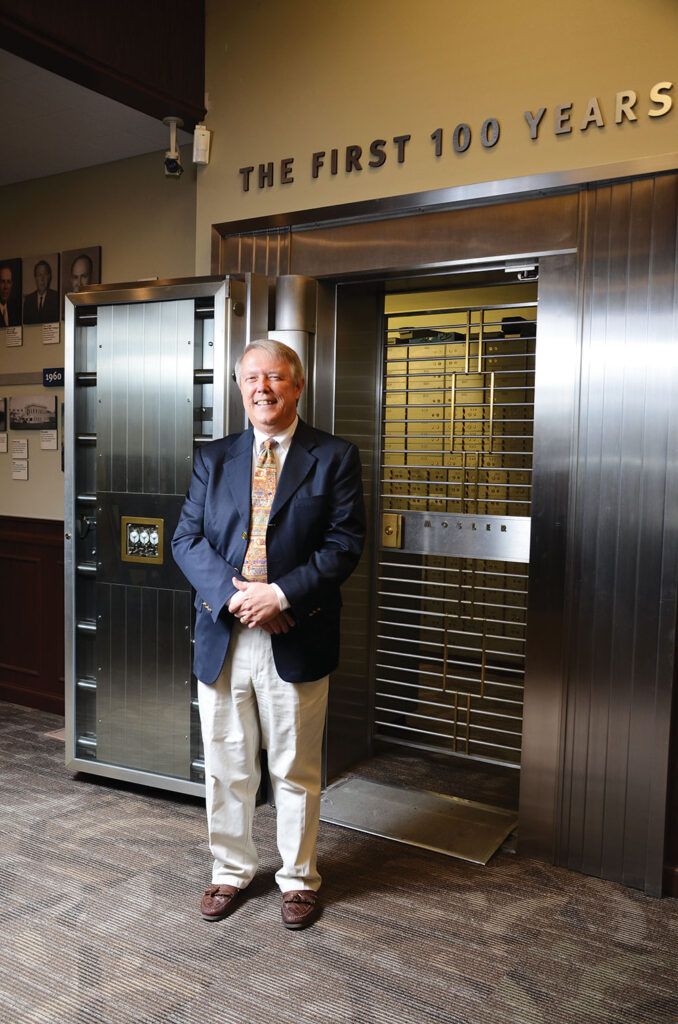2012 Revenue $49,891,000

Sometimes you want to bank where everybody knows your name. And after exactly 100 years in operation, Bank of American Fork is a moniker maven. Through good markets, bad markets and technology game-changers, the centennial company has given its neighbors a place to buy homes, build businesses and teach their kids about finance. “We do well in places where there’s a sense of community,” says Richard Beard, CEO. “When we pick where we move and grow to, we’re looking for that community spirit. It’s why we’ve been around for 100 years, and it’s why we’ll be around for 100 more.” Cheers to that.
Bank of American Fork has integrity. It’s not just a word — it’s a culture. And it’s been there from the very beginning. Integrity is a non-negotiable part of what we do.
I joined the bank in 2004. I had been a lawyer, and I sat on the board of the bank as a non-voting member. When Dale Gunther decided to retire, he asked if I would consider taking on the role of CEO. I was so impressed with the culture, it was an easy decision.
It’s a paradox. The more we have technology, the more connected we are and the more apart we are. People need a human being to help them. There are some tasks where a computer is perfectly fine — even preferable. But what we learned from this terrible recession is that people really value the human side of what we do. When someone defaults on a loan, they want to be able to sit down, look at someone in the eye and talk through the hardships.
It’s important that entrepreneurs and startups understand how loans operate. Startups generally wouldn’t go to a bank — they’d have better luck finding venture capital money. VCs expect high returns because the risks are higher. When you come to a bank the rates will be low, but it’s because we’re not equipped to take on the kind of risk VCs are. They are two entirely different buckets of money.
Bank of American Fork loves entrepreneurs. We love those individuals who work smart and map out the risks and rewards of setting out to do something great. And we love local businesses. One of the great things about community banks — about this bank — is that the money that comes here goes back into local businesses. I get a kick out of driving down the freeway and knowing we’ve played a part in financing great local establishments. It takes it to a personal level. When they make money, the bank makes money. And the best part about that? More people are employed, and the community is a better place to be.
JCW’s is the perfect example. Here are two local brothers who’ve developed a fantastic product that’s priced right. They’ve done so well and have grown dramatically, and we love being able to partner with them and watch them succeed — especially at a time when people were saying banks weren’t lending. But JCW’s was solid, and we so enjoyed helping them fund their expansion to two new locations in Traverse Mountain and Provo. And to think we did it all during the “Great Recession.”
There’s a difference between a community bank and what I call a money-centered bank. We understand this corridor we call the Wasatch Front better than any bank you could ask for. We know our customers, and our customers know us. It’s a custom fit.
There’s so much responsibility in being a community bank — and we welcome it. We don’t take it lightly. I’ve been so impressed with the way everyone at the bank has handled this financial turmoil the country has been through. When the economy took a dive, we rallied together to figure out how to protect our depositors. That was our No. 1 goal. And when institutions like Lehman and AIG started falling like king pins, we were safe. We kept it together. We were profitable throughout the entire recession, and it’s because we don’t have quitters here.
We have a basic vision purpose and value statement. It’s like the constitution. It keeps our principles in check, but it’s flexible enough that we can adapt with the changing technological environment. In 10 years we’ll be doing things at the bank we haven’t heard of today. And mobile banking is at the forefront of that. We have an IT department staying on the cutting edge. We’re not arrogant, but we are confident in our technological future. If you’re not, you’re destined to go the way of the buggy whip. Which, by the way, I bet was a great business when Bank of American Fork started. (laughs)
We understand this corridor we call the Wasatch Front better than any bank you could ask for.